Abstract
Zinc is known to be greatly involved in the regulation of immune functions. Pharmacological zinc supplementation, leading to serum zinc concentrations of more than 0.025 mM, has often been suggested to improve immune responses. However, the exact influence of elevated zinc level on immune functions has not yet been investigated. We found that zinc level selectively enhances cytokine induction by lipopolysaccharide (LPS) in a concentration-dependent fashion: as little as 0.0125 mM supplemental zinc led to nearly 50% elevated interleukin-1 beta (IL-1 beta) levels both in polymorphonuclear cells (PBMC) and whole-blood cultures. The secretion of interferon-gamma (IFN-gamma) could be increased more than 10-fold by 0.1 mM zinc. This could not be observed during stimulation with phytohaemagglutin (PHA). In contrast, zinc levels concentration-dependently down-regulated monocyte activation caused by the superantigens, staphylococcal enterotoxins A and E (SEA, SEE, more than 90% down-regulation by 0.1 mM zinc), the Mycoplasma arthritidis-derived superantigen (MAS), but not toxic shock syndrome toxin-1 (TSST-1), while T-cell response remained unaffected. This was not the result of chemical degradation of the superantigens. We assume that zinc concentration regulates interactions between SEA, SEE and MAS, but not TSST-1 and their major histocompatibility complex (MHC) class II-binding sites. Our data demonstrate that zinc levels control the secretion of IFN-gamma and monokines after both LPS and superantigen challenge within a clinically relevant range of concentrations. This reveals new perspectives and indications for zinc supplementation and also indicates potential risks of therapeutic application of zinc.
Full text
PDF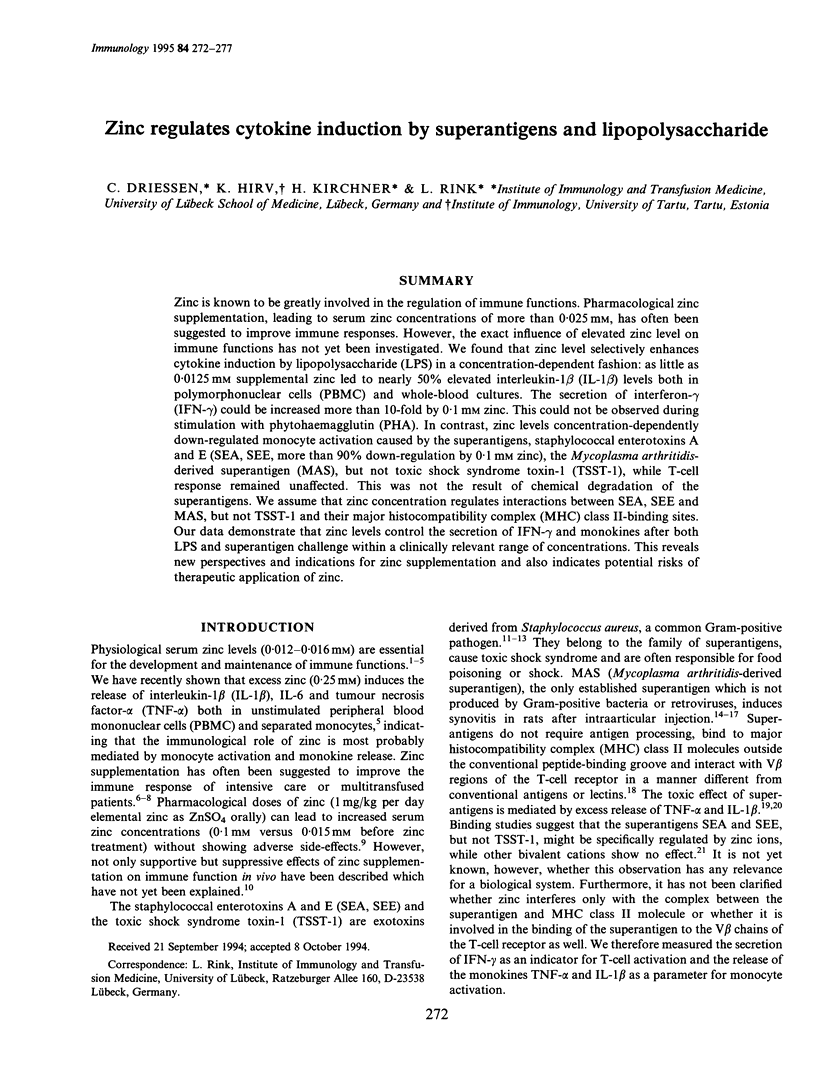
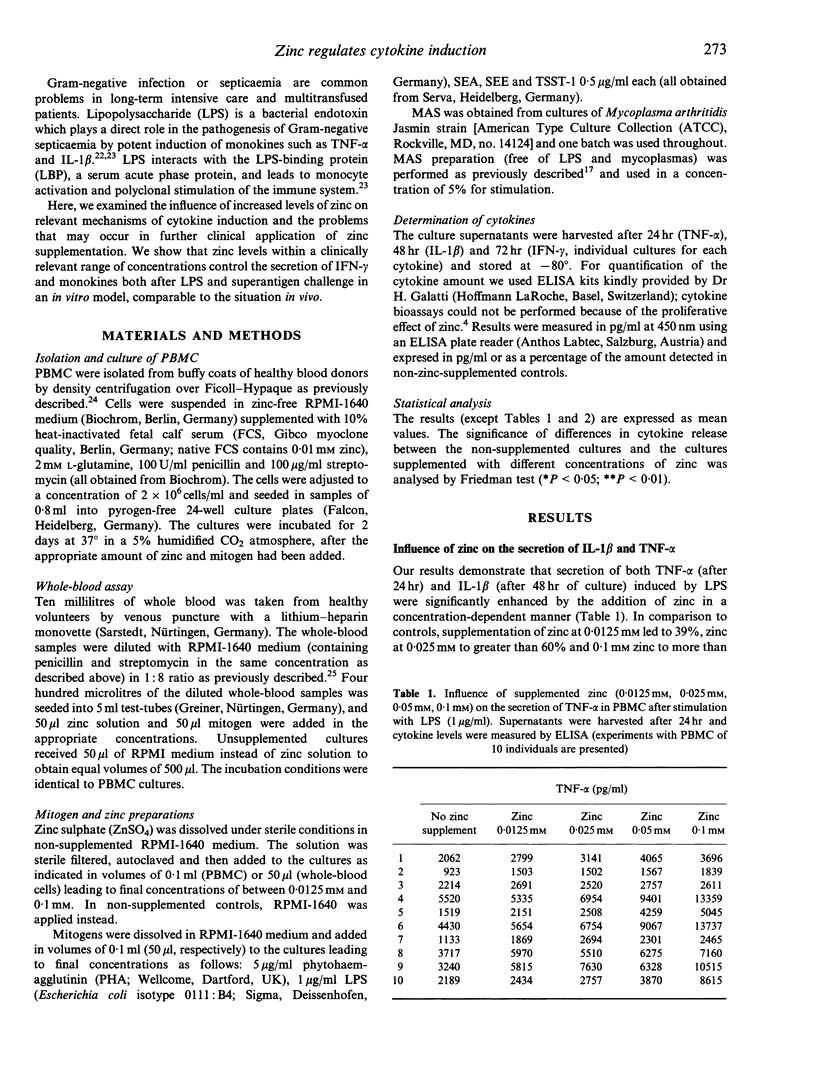
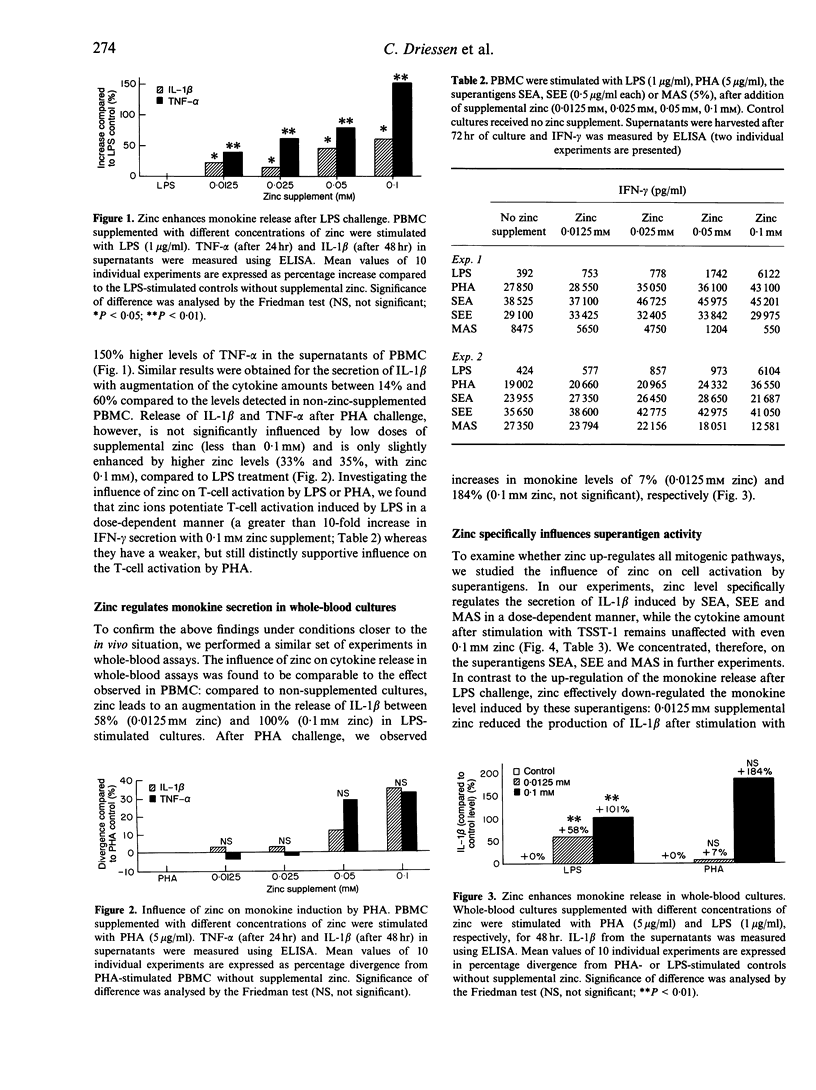
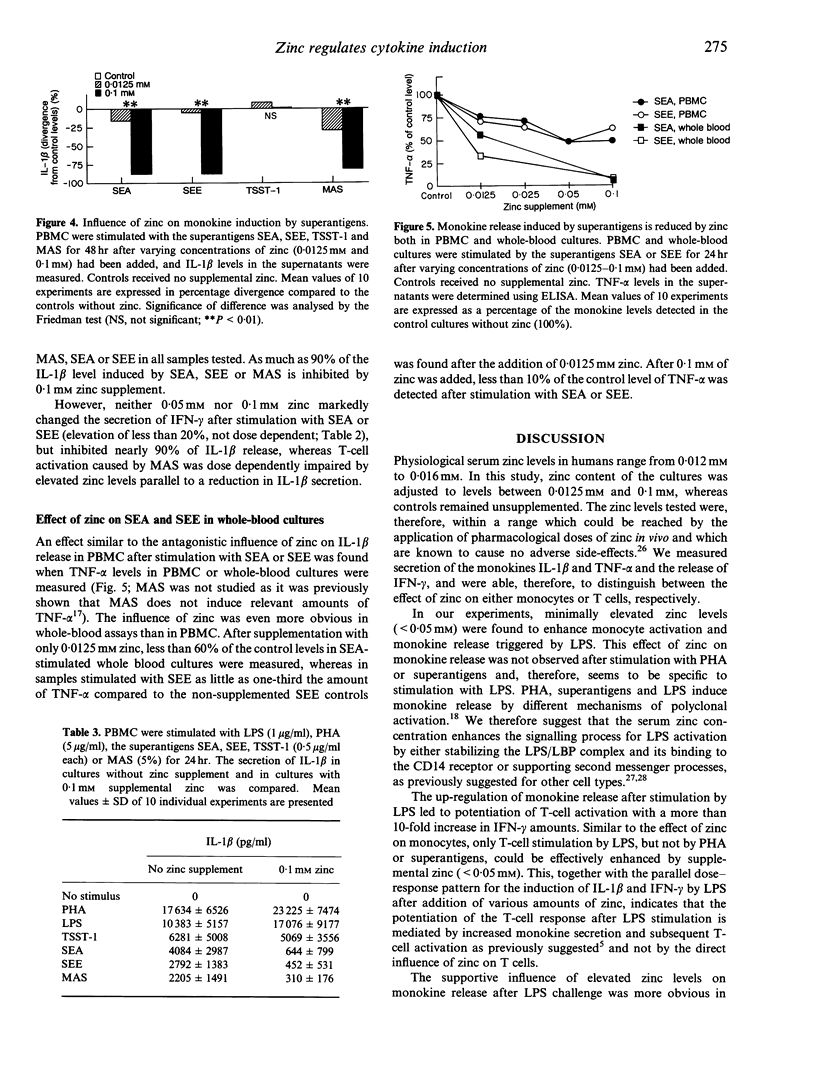
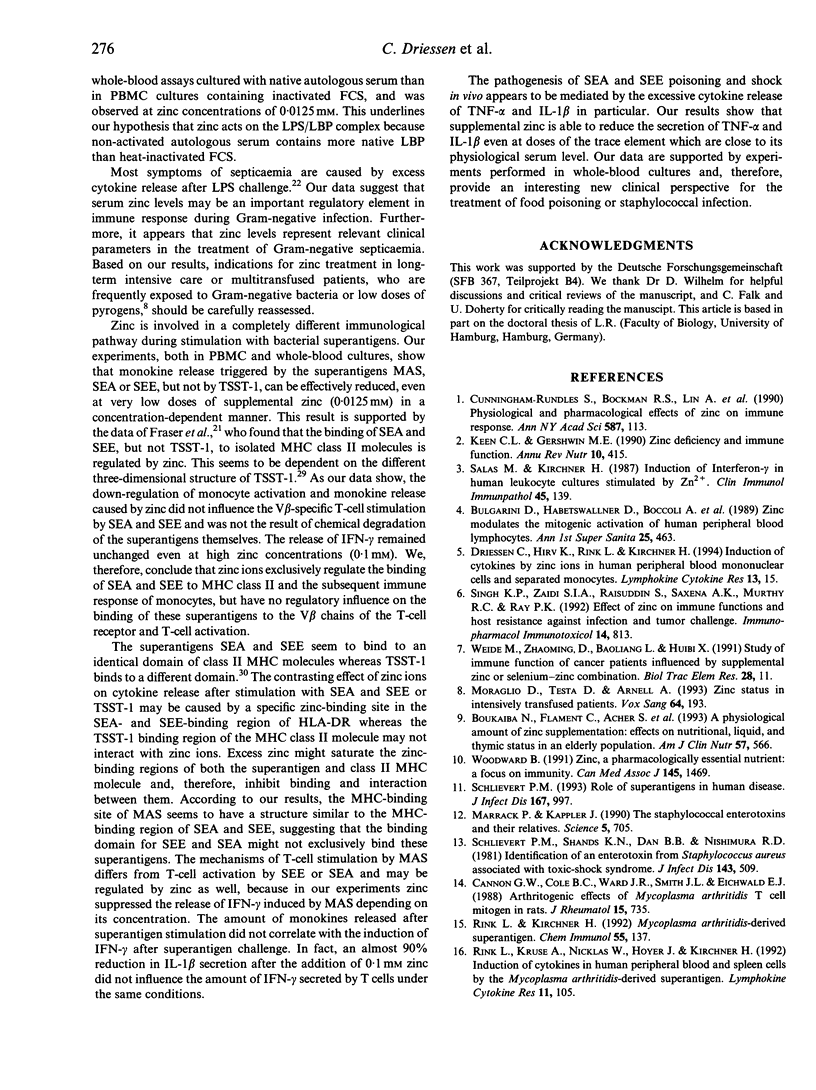
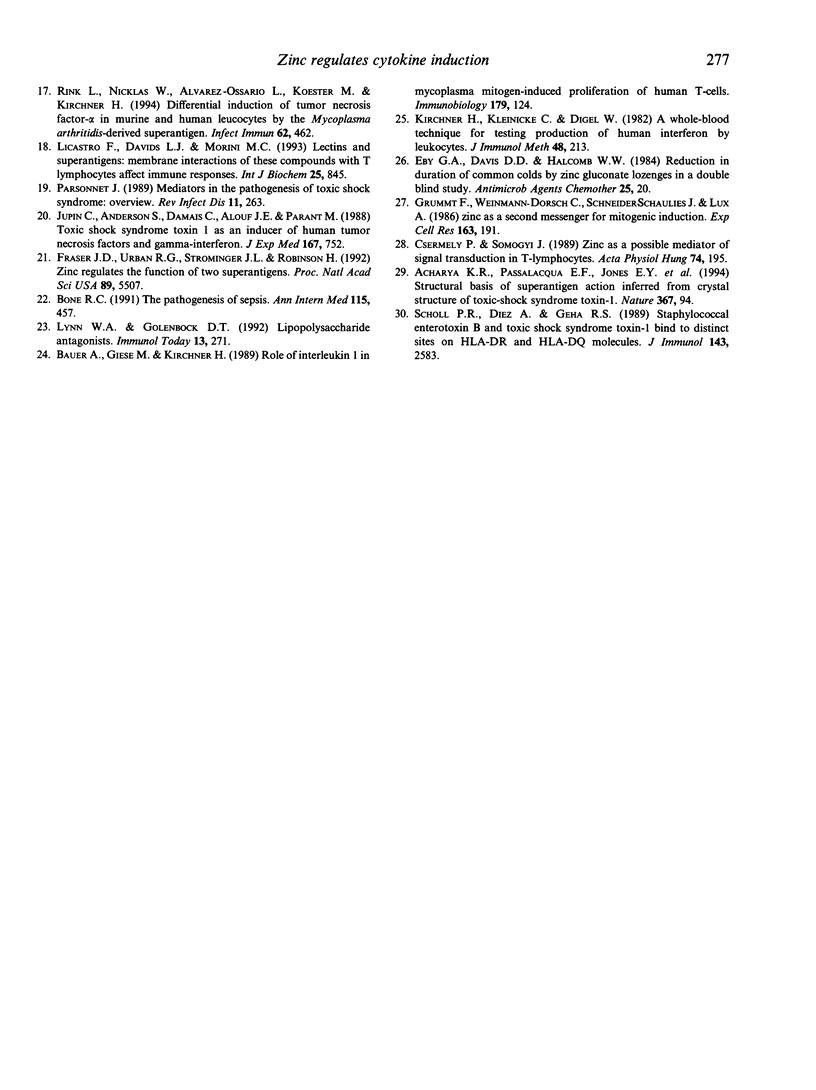
Selected References
These references are in PubMed. This may not be the complete list of references from this article.
- Acharya K. R., Passalacqua E. F., Jones E. Y., Harlos K., Stuart D. I., Brehm R. D., Tranter H. S. Structural basis of superantigen action inferred from crystal structure of toxic-shock syndrome toxin-1. Nature. 1994 Jan 6;367(6458):94–97. doi: 10.1038/367094a0. [DOI] [PubMed] [Google Scholar]
- Bauer A., Giese M., Kirchner H. Role of interleukin 1 in mycoplasma mitogen-induced proliferation of human T cells. Immunobiology. 1989 Mar;179(1):124–130. doi: 10.1016/S0171-2985(89)80011-7. [DOI] [PubMed] [Google Scholar]
- Bone R. C. The pathogenesis of sepsis. Ann Intern Med. 1991 Sep 15;115(6):457–469. doi: 10.7326/0003-4819-115-6-457. [DOI] [PubMed] [Google Scholar]
- Boukaïba N., Flament C., Acher S., Chappuis P., Piau A., Fusselier M., Dardenne M., Lemonnier D. A physiological amount of zinc supplementation: effects on nutritional, lipid, and thymic status in an elderly population. Am J Clin Nutr. 1993 Apr;57(4):566–572. doi: 10.1093/ajcn/57.4.566. [DOI] [PubMed] [Google Scholar]
- Bulgarini D., Habetswallner D., Boccoli G., Montesoro E., Camagna A., Mastroberardino G., Rosania C., Testa U., Peschle C. Zinc modulates the mitogenic activation of human peripheral blood lymphocytes. Ann Ist Super Sanita. 1989;25(3):463–470. [PubMed] [Google Scholar]
- Cannon G. W., Cole B. C., Ward J. R., Smith J. L., Eichwald E. J. Arthritogenic effects of Mycoplasma arthritidis T cell mitogen in rats. J Rheumatol. 1988;15(5):735–741. [PubMed] [Google Scholar]
- Csermely P., Somogyi J. Zinc as a possible mediator of signal transduction in T lymphocytes. Acta Physiol Hung. 1989;74(2):195–199. [PubMed] [Google Scholar]
- Cunningham-Rundles S., Bockman R. S., Lin A., Giardina P. V., Hilgartner M. W., Caldwell-Brown D., Carter D. M. Physiological and pharmacological effects of zinc on immune response. Ann N Y Acad Sci. 1990;587:113–122. doi: 10.1111/j.1749-6632.1990.tb00139.x. [DOI] [PubMed] [Google Scholar]
- Driessen C., Hirv K., Rink L., Kirchner H. Induction of cytokines by zinc ions in human peripheral blood mononuclear cells and separated monocytes. Lymphokine Cytokine Res. 1994 Feb;13(1):15–20. [PubMed] [Google Scholar]
- Eby G. A., Davis D. R., Halcomb W. W. Reduction in duration of common colds by zinc gluconate lozenges in a double-blind study. Antimicrob Agents Chemother. 1984 Jan;25(1):20–24. doi: 10.1128/aac.25.1.20. [DOI] [PMC free article] [PubMed] [Google Scholar]
- Fraser J. D., Urban R. G., Strominger J. L., Robinson H. Zinc regulates the function of two superantigens. Proc Natl Acad Sci U S A. 1992 Jun 15;89(12):5507–5511. doi: 10.1073/pnas.89.12.5507. [DOI] [PMC free article] [PubMed] [Google Scholar]
- Grummt F., Weinmann-Dorsch C., Schneider-Schaulies J., Lux A. Zinc as a second messenger of mitogenic induction. Effects on diadenosine tetraphosphate (Ap4A) and DNA synthesis. Exp Cell Res. 1986 Mar;163(1):191–200. doi: 10.1016/0014-4827(86)90572-0. [DOI] [PubMed] [Google Scholar]
- Jupin C., Anderson S., Damais C., Alouf J. E., Parant M. Toxic shock syndrome toxin 1 as an inducer of human tumor necrosis factors and gamma interferon. J Exp Med. 1988 Mar 1;167(3):752–761. doi: 10.1084/jem.167.3.752. [DOI] [PMC free article] [PubMed] [Google Scholar]
- Keen C. L., Gershwin M. E. Zinc deficiency and immune function. Annu Rev Nutr. 1990;10:415–431. doi: 10.1146/annurev.nu.10.070190.002215. [DOI] [PubMed] [Google Scholar]
- Kirchner H., Kleinicke C., Digel W. A whole-blood technique for testing production of human interferon by leukocytes. J Immunol Methods. 1982;48(2):213–219. doi: 10.1016/0022-1759(82)90195-8. [DOI] [PubMed] [Google Scholar]
- Licastro F., Davis L. J., Morini M. C. Lectins and superantigens: membrane interactions of these compounds with T lymphocytes affect immune responses. Int J Biochem. 1993 Jun;25(6):845–852. doi: 10.1016/0020-711x(93)90239-b. [DOI] [PubMed] [Google Scholar]
- Lynn W. A., Golenbock D. T. Lipopolysaccharide antagonists. Immunol Today. 1992 Jul;13(7):271–276. doi: 10.1016/0167-5699(92)90009-V. [DOI] [PubMed] [Google Scholar]
- Marrack P., Kappler J. The staphylococcal enterotoxins and their relatives. Science. 1990 May 11;248(4956):705–711. doi: 10.1126/science.2185544. [DOI] [PubMed] [Google Scholar]
- Moraglio D., Testa D., Arnelli A. Zinc status in intensely transfused patients. Vox Sang. 1993;64(3):193–193. doi: 10.1111/j.1423-0410.1993.tb05386.x. [DOI] [PubMed] [Google Scholar]
- Rink L., Kirchner H. Mycoplasma arthritidis-derived superantigen. Chem Immunol. 1992;55:137–145. [PubMed] [Google Scholar]
- Rink L., Kruse A., Nicklas W., Hoyer J., Kirchner H. Induction of cytokines in human peripheral blood and spleen cells by the Mycoplasma arthritidis-derived superantigen. Lymphokine Cytokine Res. 1992 Apr;11(2):105–108. [PubMed] [Google Scholar]
- Rink L., Nicklas W., Alvarez-Ossorio L., Koester M., Kirchner H. Differential induction of tumor necrosis factor alpha in murine and human leukocytes by Mycoplasma arthritidis-derived superantigen. Infect Immun. 1994 Feb;62(2):462–467. doi: 10.1128/iai.62.2.462-467.1994. [DOI] [PMC free article] [PubMed] [Google Scholar]
- Salas M., Kirchner H. Induction of interferon-gamma in human leukocyte cultures stimulated by Zn2+. Clin Immunol Immunopathol. 1987 Oct;45(1):139–142. doi: 10.1016/0090-1229(87)90120-6. [DOI] [PubMed] [Google Scholar]
- Schlievert P. M. Role of superantigens in human disease. J Infect Dis. 1993 May;167(5):997–1002. doi: 10.1093/infdis/167.5.997. [DOI] [PubMed] [Google Scholar]
- Schlievert P. M., Shands K. N., Dan B. B., Schmid G. P., Nishimura R. D. Identification and characterization of an exotoxin from Staphylococcus aureus associated with toxic-shock syndrome. J Infect Dis. 1981 Apr;143(4):509–516. doi: 10.1093/infdis/143.4.509. [DOI] [PubMed] [Google Scholar]
- Scholl P. R., Diez A., Geha R. S. Staphylococcal enterotoxin B and toxic shock syndrome toxin-1 bind to distinct sites on HLA-DR and HLA-DQ molecules. J Immunol. 1989 Oct 15;143(8):2583–2588. [PubMed] [Google Scholar]
- Singh K. P., Zaidi S. I., Raisuddin S., Saxena A. K., Murthy R. C., Ray P. K. Effect of zinc on immune functions and host resistance against infection and tumor challenge. Immunopharmacol Immunotoxicol. 1992;14(4):813–840. doi: 10.3109/08923979209009237. [DOI] [PubMed] [Google Scholar]
- Woods G. L., Wood R. P., Shaw B. W., Jr Aspergillus endocarditis in patients without prior cardiovascular surgery: report of a case in a liver transplant recipient and review. Rev Infect Dis. 1989 Mar-Apr;11(2):263–272. doi: 10.1093/clinids/11.2.263. [DOI] [PubMed] [Google Scholar]
- Woodward B. Zinc, a pharmacologically potent essential nutrient: focus on immunity. CMAJ. 1991 Dec 1;145(11):1469–1469. [PMC free article] [PubMed] [Google Scholar]


